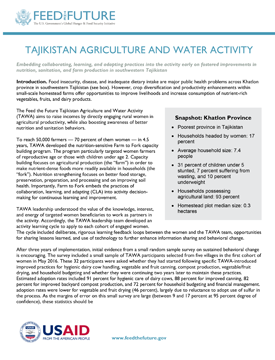To address widespread nutrition deficiencies and food insecurity, smallholder farmers in Tajikistan must increase, diversify, and add value to their agricultural production.

Embedding CLA Practices into the Activity Early on Fostered Improvements in Nutrition, Sanitation, and Farm Production in Southwestern Tajikistan .
Technical Brief | August 30, 2020

Food insecurity and inadequate dietary intake are major public health problems across Khatlon province in Tajikistan. However, the Feed the Future Tajikistan Agriculture and Water Activity aims to directly engage rural women in agricultural productivity, boosting awareness of better nutrition and sanitation behaviors.
To reach 50,000 farmers — 70 percent of them women — in 4.5 years, USAID’s Feed the Future Tajikistan Agriculture and Water Activity (TAWA) developed the nutrition-sensitive Farm to Fork capacity building program. The program, based in the Khatlon province of Tajikistan, particularly targeted women farmers of reproductive age or those with children under age two. Capacity building focuses on agricultural production (the “farm”) in order to make nutrient-dense foods more readily available in households (the “fork”). Nutrition strengthening focuses on better food storage, preservation, preparation, and processing and on improving soil health. Importantly, Farm to Fork embeds the practices of collaboration, learning, and adapting (CLA) into activity decision-making for continuous learning and improvement.
